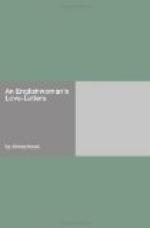The Baptistry has a roof of echoes that is wonderful,—a mirror of sound hung over the head of an official who opens his mouth for centimes to drop there. You sing notes up into it (or rather you don’t, for that is his perquisite), and they fly circling, and flock, and become a single chord stretching two octaves: till you feel that you are living inside what in the days of our youth would have been called “the sound of a grand Amen.”
The cathedral has fine points, or more than points—aspects: but the Italian version of Gothic, with its bands of flat marbles instead of moldings, was a shock to me at first. I only begin to understand it now that I have seen the outside of the Duomo at Florence. Curiously enough, it doesn’t strike me as in the least Christian, only civic and splendid, reminding me of what Ruskin says about church architecture being really a dependant on the feudal or domestic. The Strozzi Palace is a beautiful piece of street-architecture; its effect is of an iron hand which gives you a buffet in the face when you look up and wonder—how shall I climb in? I will tell you more about insides when I write next.
I fear my last letter to you from Lucerne may either have strayed, or not even have begun straying: for in the hurry of coming away I left it, addressed, I think, but unstamped; and I am not sure that that particular hotel will be Christian enough to spare the postage out of the bill, which had a galaxy of small extras running into centimes, and suggesting a red-tape rectitude that would not show blind twenty-five-centime gratitude to the backs of departed guests. So be patient and forgiving if I seem to have written little. I found two of yours waiting for me, and cannot choose between them which I find most dear. I will say, for a fancy, the shorter, that you may ever be encouraged to write your shortest rather than none at all. One word from you gives me almost as much pleasure as twenty, for it contains all your sincerity and truth; and what more do I want? Yon bless me quite. How many perfectly happy days I owe to you, and seldom dare dream that I have made any beginning of a return! If I could take one unhappy day out of your life, dearest, the secret would be mine, and no such thing should be left in it. Be happy, beloved! oh, happy, happy,—with me for a partial reason—that is what I wish!
LETTER XXXI.
Dearest: The Italian paper-money paralyzes my brain: I cannot calculate in it; and were I left to myself an unscrupulous shopman could empty me of pounds without my becoming conscious of it till I beheld vacuum. But the T——s have been wonderful caretakers to me: and to-morrow Arthur rejoins us, so that I shall be able to resume my full activities under his safe-conduct.
The ways of the Italian cabbies and porters fill me with terror for the time when I may have to fall alive and unassisted into their hands: they have neither conscience nor gratitude, and regard thievish demands when satisfied merely as stepping-stones to higher things.




